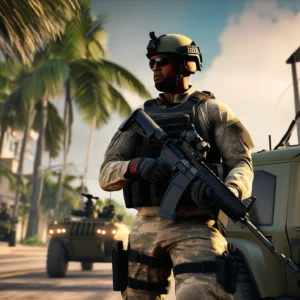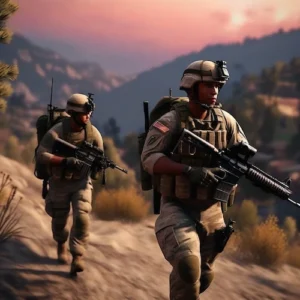Schofield Barracks, Hawaii | Military Legal Guide
Introduction
If you’re stationed at Schofield Barracks, Hawaii, you might encounter various military legal challenges. Navigating the complexities of military law can be daunting, especially when stationed away from home. This guide will empower you with essential information, highlight your rights, and provide access to resources that ensure you are prepared for any legal challenges at Schofield Barracks.
We introduce the UCMJ Survival Guide, a comprehensive resource designed for service members. Download it for free or find it available on Amazon.
Overview of Schofield Barracks, Hawaii and Surrounding Area
Established in 1908, Schofield Barracks is a critical installation for the United States Army located on the island of Oahu, Hawaii. Its main purpose is to support peacekeeping and humanitarian missions across the Pacific region. The base houses the 25th Infantry Division which plays a pivotal role in joint military activities.
The surrounding town of Wahiawa offers a unique blend of island culture and military presence. The community is dynamic, with a mixture of military personnel and local residents, creating a diverse demographic. Understanding local legal culture and norms is essential for clear communication and effective interactions.
Brief History of Schofield Barracks, Hawaii
Schofield Barracks was established in 1908 to provide a base for military operations in the Pacific. During World War II, it played a significant role as a strategic location following the attack on Pearl Harbor. Over the years, the base has been pivotal in supporting missions in Korea, Vietnam, and the Middle East.
Today, Schofield Barracks continues to evolve, maintaining a focus on training and readiness, contributing to global peacekeeping and disaster response efforts.
Military Law & Legal Issues at Schofield Barracks, Hawaii
Court-Martial Under the UCMJ
- Common charges at Schofield often involve Article 120 (sexual assault), 128b (domestic violence), and Articles 133/134 (general misconduct).
- The court-martial process involves a thorough investigation, preferring charges, and a trial with the possibility for counsel to defend the accused.
- Military members have the right to civilian counsel, which can provide additional defense strategies due to their independent and specialized expertise.
Article 15 / NJP
- Deciding to accept or refuse NJP impacts your military career long-term and involves a complex decision-making process that might require legal advice.
- Consider the implications on promotions, postings, and military records when confronted with an Article 15.
GOMORs & Letters of Reprimand
- Your response strategy needs to distinguish between local and permanent filings. Filing these at the Department of the Army level may significantly affect your record.
- Developing strong rebuttal strategies can mitigate the negative impact on your career.
Administrative Separation (Chapters)
- The process differs for enlisted personnel and officers—ranging from Boards of Inquiry to separation boards.
- To preserve an Honorable discharge, adhering to proper procedures and timely legal actions is crucial.
Command-Directed Investigations (CDIs) & IG Complaints
- Understanding common misuse and the risks of waiving your rights during CDIs is vital.
- Be cautious about giving statements which might impact your case adversely.
Legal Services Available at Schofield Barracks, Hawaii
Base Legal (JAG)
Schofield Barracks’ JAG office offers essential services such as powers of attorney and wills. However, they do not provide assistance with criminal defense cases or boards.
Civilian Military Defense Lawyers
Engaging a civilian lawyer can be beneficial due to their independence, confidentiality, and trial experience. They can provide personalized attention and innovative defense strategies.
Download your free copy of the UCMJ Survival Guide to learn how to protect your career, rights, and military future.
Some Well-Known Civilian Military Defense Lawyers that Serve this Area
There’s no single “best” military defense lawyer. When choosing representation, consider these key qualities:
- Proven track record in UCMJ, trial, Article 15, and court-martial defense
- Experience with administrative separation boards and GOMOR rebuttals
- Familiarity with military law protocols and base-specific culture
- Clear communication and timely responsiveness
- Willingness to provide personalized support and strategic advice
1. Gonzalez & Waddington, LLC
Website: ucmjdefense.com
Based in: Florida / Worldwide
Specialties: Article 120 UCMJ defense, military sex crimes, war crimes, administrative separations, high-profile court-martials
Why they’re on the list:
Military defense lawyers Michael Waddington and Alexandra Gonzalez-Waddington are widely considered among the best sex crime and war crime defense attorneys in the military justice system. With hundreds of high-profile military trials under their belts—including cases involving SEAL Team 6, Green Berets, and fighter pilots—they are known for unmatched trial strategy, elite cross-examination skills, and a record of full acquittals. Michael is also a bestselling author of Kick-Ass Closings and Kick-Ass Impeachment.
2. Tim Bilecki – The Bilecki Law Group

Website: bileckilawgroup.com
Based in: Florida / Global
Specialties: Military sexual assault, fraud, international courts-martial
Why he’s on the list:
Tim Bilecki is a former Army JAG with a global reputation for defending complex military cases, often involving combat zones or classified operations. With a commanding presence in the courtroom and a reputation for strategic pretrial dismantling of government cases, Bilecki has become a go-to lawyer for officers and senior enlisted members facing high-level prosecution. His firm focuses on international clients and military members in the Pacific and Asia regions.
3. Artie Vaughn

Website: vaughndefense.com
Based in: Alabama, but defends cases worldwide
Specialties: Article 120 UCMJ, toxic command climates, stacked allegations
Why he’s on the list:
He built his rep the old-school way—by walking into hostile courtrooms and winning cases nobody else would touch. Vaughn’s specialty is turning around cases that look unwinnable on paper: Article 120 allegations where the accused is being railroaded by command, stacked charges driven by command influence, and cases involving combat stress, PTSD, and behavioral health complexities that most lawyers don’t know how to argue.
4. Terri R. Zimmermanna
Website: www.texasdefenselawyers.com/terri-zimmermann/
Based in: Conroe, TX
Specialties:Appellate litigation, military crimes, UCMJ defense
Why he’s on the list:
Terri R. Zimmermann is a nationally-recognized expert criminal litigator with over 30 years of experience representing citizens accused of violating the law or convicted of crimes in civilian and military courts. Her unwavering passion is to secure the best possible outcome for each client, whether through challenging the prosecution at trial or presenting compelling appeals to overturn convictions. Ms. Zimmermann is on a mission to ensure that government entities, be it state, federal, or military, adhere to the rules, treating her clients fairly and with dignity.
5. Bill Cassara
Website: court-martial.com
Based in: Augusta, GA
Specialties: Appellate litigation, military sex crimes, UCMJ defense
Why he’s on the list:
With decades of experience and deep knowledge of military case law, Philip Cave is a sought-after expert for appeals and complex legal motions. His firm often collaborates with other attorneys to handle high-level constitutional or evidentiary challenges.
Why These Lawyers Made the List
This list is based on actual courtroom experience, published verdicts, legal credentials, peer recognition, and results—not on paid placements or advertising. Many so-called “military lawyers” have never defended a court-martial trial. These attorneys do it regularly and at the highest levels.
Local Military/Government Legal Resources
FAQ Section
- Does the UCMJ apply off base at Schofield Barracks, Hawaii?
- Can I request a civilian lawyer while stationed at Schofield Barracks?
- What happens if I refuse an Article 15?
- Is Schofield Barracks, Hawaii considered a high-risk legal environment?
